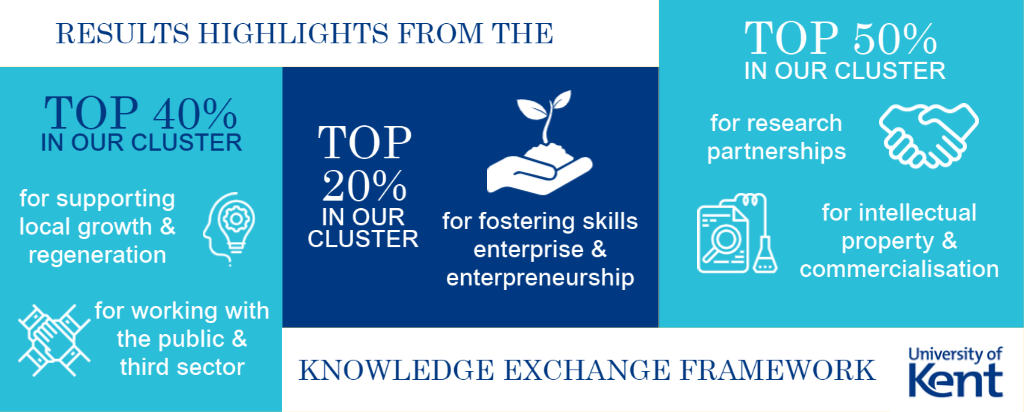The University of Kent has been rated highly for skills, enterprise and entrepreneurship in this years’ Knowledge Exchange Framework (KEF) assessment.
The KEF, which proposes a third pillar of university activity assessment alongside the Research Excellence Framework (REF) and Teaching Excellence Framework (TEF), graded Kent in the top 20% of our cluster group for our skills, enterprise and entrepreneurship development, and in the top 40% for our local growth and regeneration focus.
We were assessed across seven unique perspectives of knowledge exchange activity and compared with 20 other UK higher education institutions under an umbrella cluster ‘X’. This cluster consists of large, research-intensive, broad-discipline universities undertaking a significant amount of world-leading research.

Led by Research England, the 2020 submission of the KEF has been run as a development year after being included as a Government policy in the Industrial Strategy White Paper in 2017. UK Research and Innovation (UKRI) will be evaluating the results with a view to making full participation from higher education institutions a condition of knowledge exchange funding from the academic year 2021/2022.
Following this institutional-level exercise, we will be:
- Focusing on increasing the visibility of the support the University can offer businesses in the region;
- Collecting data that showcases the impact of the University’s research and knowledge exchange work; and
- Pursuing more collaborative opportunities with business, industry, and the public sector to develop research areas.
Carole Barron, Director of Knowledge Exchange and Innovation, said: ‘I am delighted the KEF results clearly demonstrate our commitment to local growth and regeneration through our commitment to developing meaningful research partnerships, delivering high quality professional development programmes, and commercialising our intellectual assets.’
Professor Shane Weller, Deputy Vice-Chancellor Research & Innovation at the University of Kent, said: ‘It is very pleasing indeed to see the KEF results reflecting the University’s significant contribution to local growth and regeneration, as well as skills, enterprise and entrepreneurship, and public and community engagement. The University has performed very well in a strong cluster of HEIs. Alongside the University’s participation in the Knowledge Exchange Concordat, these results are particularly helpful in highlighting those areas in which we have the opportunity to develop further, including working with businesses, research partnerships, and commercialisation. The University is now well placed to build on the solid foundations that we have established in the important field of knowledge exchange.’

